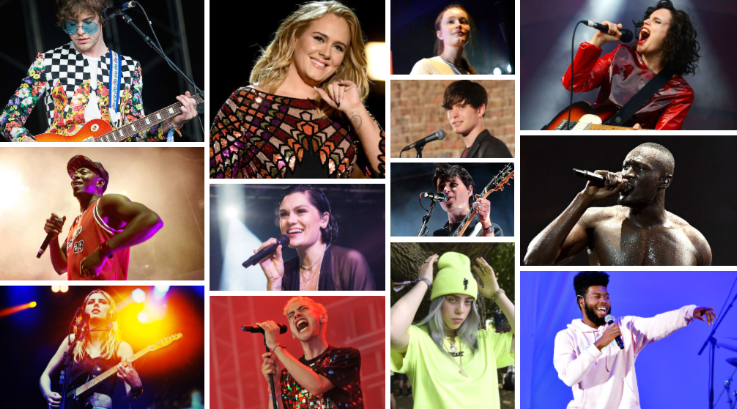British-Jamaican soul singer Celeste has won BBC Music’s Sound of 2020, which is given to artists who are tipped for success in the coming year.
The 25-year-old’s entrancing voice and jazz-steeped songs made her the runaway winner, after votes were counted from 170 music critics and industry figures.
She joins the likes of Adele, Haim and Ellie Goulding, who have all topped the Sound Of… list in previous years.
Indie band Easy Life came second, while pop-punk firebrand Yungblud was third.
“I’m really, really happy,” Celeste said, after being told she’d won. “It’s like all of the work that went in throughout the [last] year wasn’t invisible.
“I can’t wait now to see what the rest of the year will look like. I’m so thrilled and so excited. I can’t wait.”
Born in Los Angeles and raised in Brighton, Celeste Waites started making music as a teenager, while working in pubs and charity shops to make ends meet.
She wrote her first song, Sirens, at the age of 17, in tribute to her Jamaican father, who had died of lung cancer a year earlier. The track was uploaded to YouTube, where it caught the attention of her manager – but success was still a long way off.
Three years ago, the singer moved to London with just £100 in her pocket; but was fired because she kept skipping work to write songs.
“I’d rather call in sick and go to the studio than have the money for that month,” she tells the BBC, “and there was a couple of months where I was like, ‘What am I going to do?'”
Luckily, unemployment coincided with Celeste’s discovery – first by Lily Allen’s label Bank Holiday Records, which released her first EP, and later by Polydor, who signed her in 2018.
Since then, she’s supported Janelle Monáe, Neneh Cherry and Sound of 2012 winner Michael Kiwanuka on tour. Fellow soul singer Jorja Smith recently described Celeste as “incredible, stunning, everything”.
Selected winners and nominees
- 200350 Cent, Electric Six, Dizzee Rascal
- 2008Adele, Vampire Weekend, MGMT
- 2011Jessie J, James Blake, Anna Calvi
- 2015Years & Years, Stormzy, Wolf Alice
- 2018Sigrid, Khalid, Billie Eilish
BBC
“Celeste is a phenomenal talent, a voice that does not come around often and when you are exposed to it, is impossible to ignore,” said Radio 1’s Annie Mac, who has supported the singer on her show.
“I have received countless emotional texts from listeners who have had to sit in their car and lose themselves to her song Strange before carrying on with their evening. Her songwriting is personal and poignant but with universal appeal.
Celeste’s victory in the BBC Sound Of 2020 follows similar accolades from the Brits, where she received the rising star award, and BBC Music Introducing, who named her their artist of the year – but she says awards have never been the goal.
“When I write music I never think about whether anybody wants to listen to it,” she explains. “I just keep pushing myself in all these different ways where eventually, hopefully, I’ve made something distinct that can be enjoyed by other people.”
Read the full interview below.
Congratulations on winning the Sound Of 2020. How does it feel?
There’s an element of heightened expectation, potentially. You really want to make sure you live up to it but, ultimately, it’s really encouraging to know you’re on the right track.
What do you hope it will do for your career?
Hopefully it’ll mean more people will hear my music. At the moment, there are people listening to it – but it’s not, like, everyone in England, so I hope that will widen out.
Let’s go right back to the beginning… What were you into as a kid?
All sorts of things. I was very hyperactive and I was very much into sports, and on Saturday I’d go to ballet. The teachers there took a liking to me and they told my mum, I could go to a performing arts school on a scholarship. So I went there for a year when I was 10.
What was that like?
It was really intense, everyone was being nurtured to be a product of the school.I remember saying to my mum, “Everyone’s like robots!” So I went back to normal school with my friends.
Was there a lot of music at home?
None of my family played a musical instrument – but there was such an appreciation for lyrics and melody. On a Friday night, we’d put music on and my step-dad would pick it apart, he’d be like, ‘the strings in this part are nuts’. So without really thinking about it, I began to take note of those things myself.
Which artist got you hooked?
My granddad had this cherry red Jaguar, and he only had three CDs in it – but one of them was Aretha Franklin, and that’s the one I remember the most.
I love her for her storytelling – just how she structures her songs and her raw delivery and her emotion. From the first note she sings, it doesn’t relent. That’s something I’m interested in, in any music I listen to. It just has to be really raw and real and true.
Is it true that you started collecting vinyl in your teens?
Yeah! There was a charity shop at the top of my mum’s road and I used to go in there and rummage around the vinyl section. Initially, I was just interested in the artwork – I didn’t even have a record player at the time!
A few years later, I got to listen to those things I’d been collecting for three years, music from the 50s and 60s like Billie Holiday and Sarah Vaughan and Shirley Bassey, and I was like, “Woah, this sounds amazing!”
Were you already thinking you could become a singer?
Actually, at my college we were all encouraged to go to university and I started really optimistically. I took on loads of subjects – English literature, history, fine art and media studies – but then my dad passed away in the first term. I came back after that a bit bewildered and confused. I stopped working and going to classes, and I wasn’t handing in my work.
My teachers were confused because I hadn’t told them, or even my friends [about my dad dying]. When I finally explained, they gave me the opportunity to drop some subjects – and that’s when I took up music. But most of the focus I put into that was in my own time. It wasn’t in that class.
Was it hard to be creative in school?
Definitely. If you’re slightly more introvert, which I was at the time, you don’t necessarily want to sing in a room of 20 or 30 people.
But I had some friends who played in bands and they were like, “We’ve heard you can sing, do you want to come round to our house after school and try and play some stuff?” And I loved it. It was self-discovery through my friends helping me build my self-confidence.
What was your first gig?
We played a cover of Wild Wood by Paul Weller, and some other songs in a little bar underground near the seafront in Brighton. I just remember the process of being in that room and performing took over; and any nerves I had evaporated. People were surprised because they’d known me growing up but they had no idea I could sing.
Daydreaming was the song that got you noticed. When was that written?
I was actually working in a pub! It was one of the hottest days of the year and all my friends were texting me like, “We’re going to the beach!” but I was stuck in work.
And there was a little side door that used to blow open sometimes; and a tiny beam



